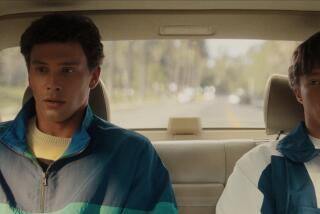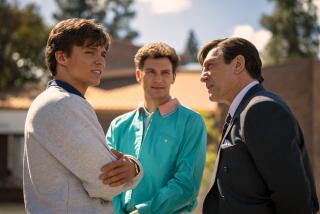Freddy: No More Mr. Bad Guy?
- Share via
No doubt about it: Freddy Krueger is Big Biz.
Like: “Nightmare on Elm Street 4: The Dream Master” was our national No. 1 grossing picture (dollar-wise and gross-wise) the last three weekends. Fans memorize his lines. Freddy masks and hand-claw gloves were reportedly the top-selling Halloween costume items last year. Competing rap songs celebrating the character, from the Fat Boys and D. J. Jazzy Jeff. There’s a dance called “Do the Freddy.” And “the Freddy Fan Club has more members than those of rock groups like U2 or Van Halen,” enthuses a press release on the series. . . . And the syndicated TV series--”Freddy’s Nightmares”--starts Oct. 3 (to be seen locally on KHJ-TV Channel 9).
But . . . whoa, isn’t this wacky guy the same Freddy who used to rape little kids and burn them to death before his own demise at the hands of vengeful parents?
Yes, and not everyone is signing up to join Freddy’s fan club--especially not those who work in the area of child sexual abuse and think Freddy’s increasing popularity diminishes, if not mocks, the real horror.
Child psychiatrist Dr. Roland Summit, who has been consulted in the McMartin Pre-school molestation case, feels that the very existence of the Freddy character as a monster damages the cause of identifying real offenders. “When you carry on that stereotype of making them monstrous and violent, it’s misleading,” he said. “When people encounter a real child molester, they can’t believe that that’s what he is. The reality is that most child molesters are very attractive or likeable or trustworthy people--and that’s the real menace they present. If child molesters come across as dangerous-looking, then it’d be easy enough to recognize and avoid them.”
Making Freddy “some kind of a pop hero”--as has happened with the more recent entries in the series--is “pretty distressing,” Summit said.
“I doubt that even if he were depicted consistently as a child molester, it would interfere with his popularity, if he is made to be as invincible as I guess he is,” said Summit. “I suspect that his popularity comes from a kind of counter-phobic or reverse fascination with somebody who is absolutely immortal and indestructible, somebody who can get away with anything he wants to do.
“There’s kind of a perverse appeal for lawlessness, and I’m afraid that’s what probably endears him to an adolescent age group which often feels constrained and boxed in with rules and has a fascination for the concept of somebody being able to get away with murder.
“If the public, because of the popularity and effectiveness of the movies, develops a fascination for Freddy Krueger, that’s one thing. That isn’t necessarily deliberate on the producers’ part. But when the producers jump on the bandwagon and start sponsoring Freddy Krueger Fan Clubs for the sake of glamorizing their movie, that’s questionable.
“It’s adding insult to the injury of the original story line itself. To take a child molester, give him a righteous vengeance role, and then somehow glorify or idealize his activities and pander to that--that’s a (bad) combination of stuff.”
Film critics by and large haven’t been quite as hard on the series as child abuse experts. But one outraged exception is Dann Gire, who writes for the Chicago Daily Herald as well as the respected sci-fi/horror magazine Cinefantastique. He’s written several angry pieces about the progression of the violent series toward camp humor, and can’t understand why other critics aren’t more incensed.
“This character started out as the quintessence of Evil,” said Gire. “His whole claim to fame is he has sexually abused--which I assume to mean raped--and killed these children and burned their bodies in the boiler room at the place where he worked. The first film was very scary and treated him as a very vile, repugnant character. In ‘II’ and ‘III,’ something very odd occurred: he became the Spuds McKenzie of horror characters. They’ve taken this character and tried to shave off the rough edges and turn him into this party animal.
“They’ve taken this character--who is a child molester and killer whose spirit came back to haunt the parents who killed him--and turned him into the de facto hero of this film series. If you stuck a lamp shade on his head, he’d be the type of guy you’d want to take to a party. ‘Aw, let him kill somebody! It’ll be great!’ What the producers have done, taking a child-rapist and turning him into a party-animal celebrity, is nothing short of phenomenal. The Republicans could float him. It’s almost as good an image-polishing job they’ve done.
“I bet (producer Robert Shaye) now wishes Freddy had not been a child-molester in the first film. I’m sure that in retrospect, had he known Freddy Krueger would become a phenomenon, he maybe wishes the character hadn’t been created so brutally to begin with. But it’s the character they’re stuck with, and halfway through they’re trying to change him into a more endearing, lovable guy.”
That lovable quality may be magnified in the “Freddy’s Nightmare” TV show, an anthology series to hosted by Freddy a la Alfred Hitchcock. A series rep said the pilot episode will show “what really happened” at Freddy’s original trial, before he was let off on a technicality and slaughtered by the parents of the children that he reputedly molested.
The inference: Freddy may now turn out to have been an innocent victim of a righteous vendetta, though that’s certainly not the way the character was conceived.
Critic Gire says that audiences are indeed cheering Freddy’s witty murders, and he doubts the producer’s contention that audiences see each climax as a triumph of Good over Evil.
“They are happy endings--but because Freddy always wins. Through the magic of sequels, he is eternal; he can never be bested or destroyed. In these films there is no Good, only Evil, and no hope or escape, just inevitable death--because if you don’t get it in one film, you’ll get it in the sequel.
“You couple that with statistics in teen suicide--there is a responsibility that the film makers have ignored, and for what? A $100-million film series. Suicides are extremely prevalent in the teen years, and the No. 1 group of people attracted to these films is teens.
“These films are pandering to and perhaps even augmenting feelings of despair--that no matter what you do, you’re doomed. That reinforces teen-agers’ feelings of worthlessness, that no matter how good they are, eventually the powers of darkness and negativism are going to overtake them because they are unbeatable.”
More to Read
The biggest entertainment stories
Get our big stories about Hollywood, film, television, music, arts, culture and more right in your inbox as soon as they publish.
You may occasionally receive promotional content from the Los Angeles Times.










